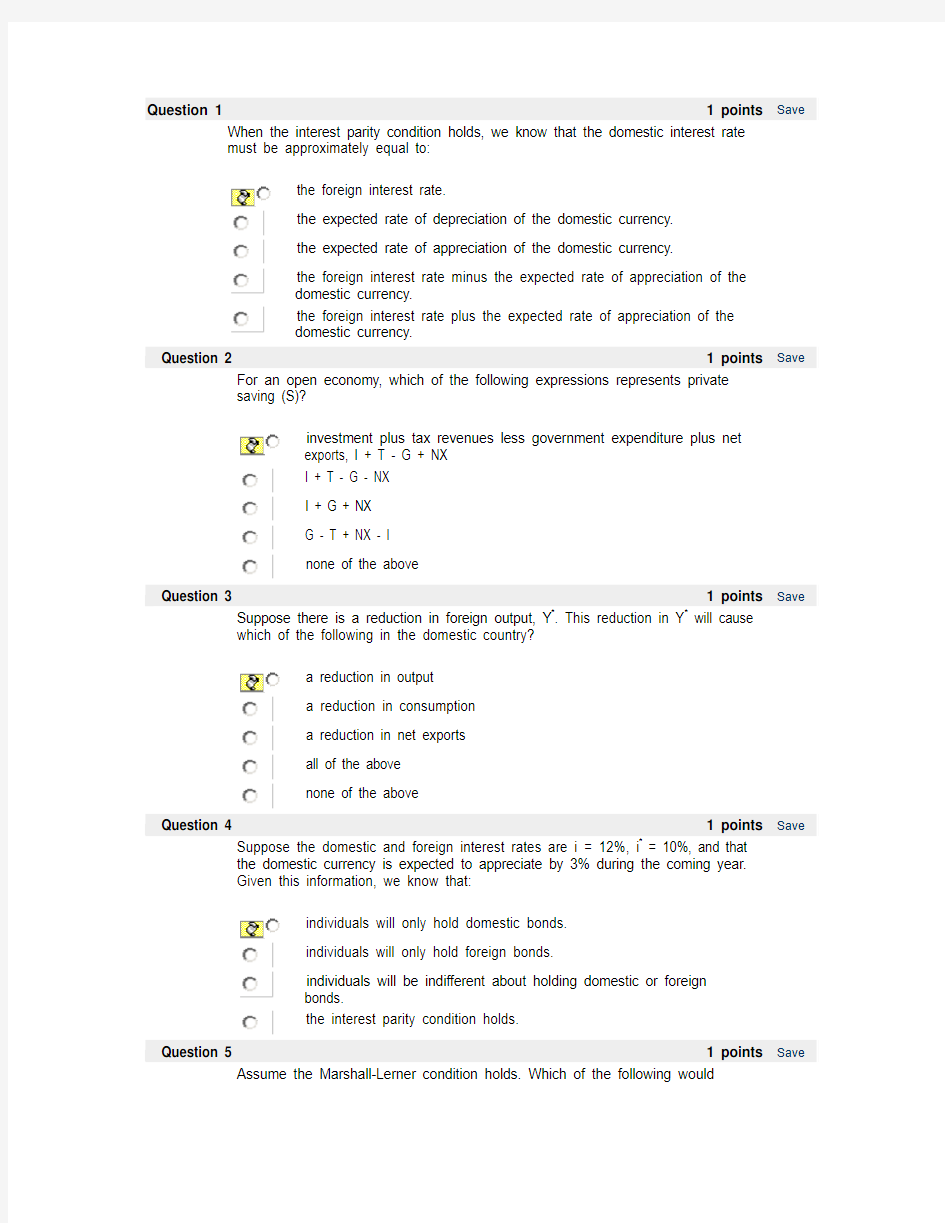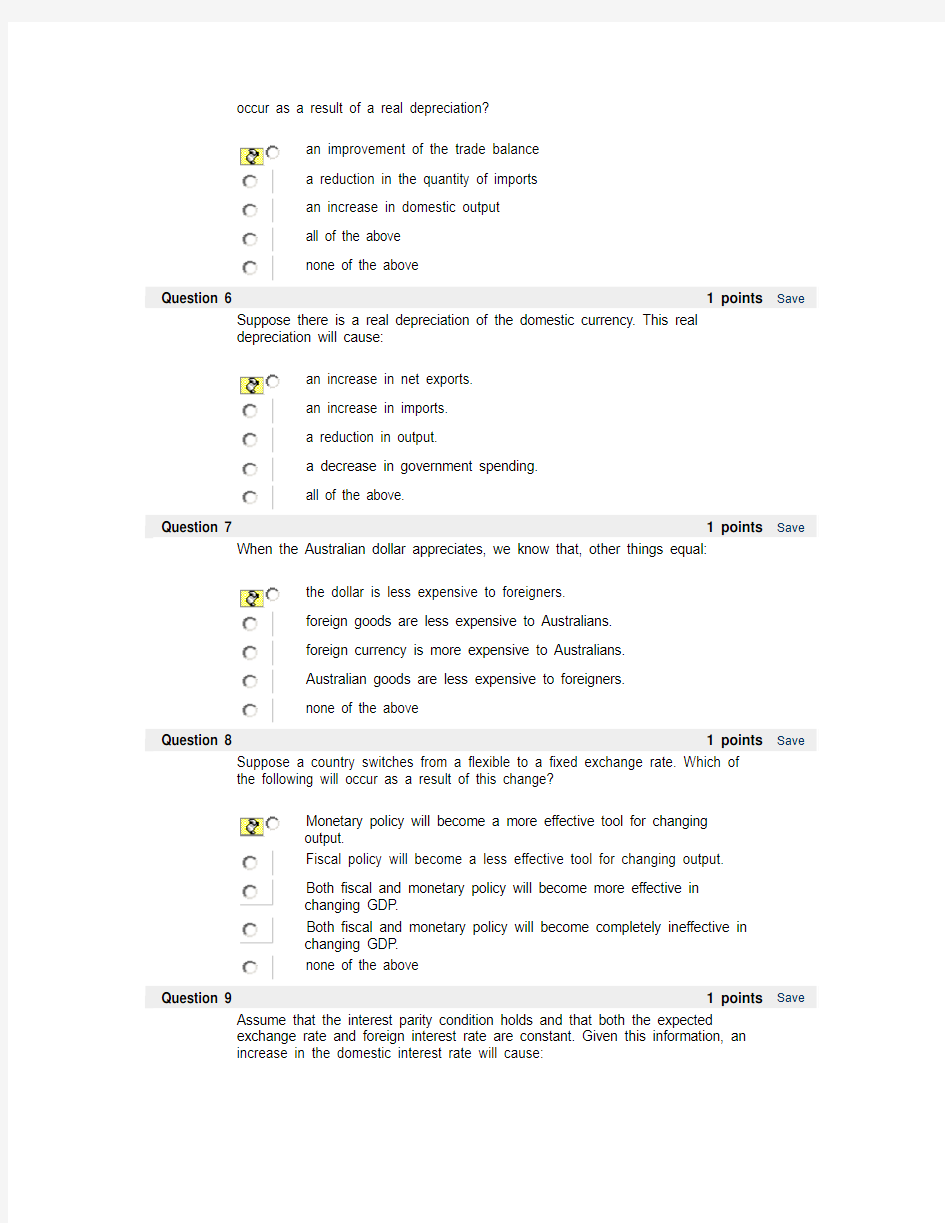ECON5002_Macroeconomics_2007 Semester 2_Quiz 5


must be approximately equal to:
the foreign interest rate.
the expected rate of depreciation of the domestic currency. the expected rate of appreciation of the domestic currency.
the foreign interest rate minus the expected rate of appreciation of the domestic currency.
the foreign interest rate plus the expected rate of appreciation of the domestic currency.
Question 2
saving (S)?
investment plus tax revenues less government expenditure plus net exports, I + T - G + NX I + T - G - NX I + G + NX
G - T + NX - I none of the above
Question 3
which of the following in the domestic country?
a reduction in output a reduction in consumption a reduction in net exports
all of the above none of the above
Question 4
Suppose the domestic and foreign interest rates are i = 12%, i = 10%, and that the domestic currency is expected to appreciate by 3% during the coming year. Given this information, we know that:
individuals will only hold domestic bonds. individuals will only hold foreign bonds.
individuals will be indifferent about holding domestic or foreign bonds.
the interest parity condition holds.
Question 5
Assume the Marshall-Lerner condition holds. Which of the following would
occur as a result of a real depreciation?
an improvement of the trade balance
a reduction in the quantity of imports
an increase in domestic output
all of the above none of the above
Question 6
depreciation will cause:
an increase in net exports. an increase in imports. a reduction in output.
a decrease in government spending. all of the above.
Question 7
When the Australian dollar appreciates, we know that, other things equal:
the dollar is less expensive to foreigners. foreign goods are less expensive to Australians. foreign currency is more expensive to Australians.
Australian goods are less expensive to foreigners. none of the above
Question 8
the following will occur as a result of this change?
Monetary policy will become a more effective tool for changing output.
Fiscal policy will become a less effective tool for changing output.
Both fiscal and monetary policy will become more effective in
changing GDP.
Both fiscal and monetary policy will become completely ineffective in changing GDP. none of the above
Question 9
exchange rate and foreign interest rate are constant. Given this information, an increase in the domestic interest rate will cause:
an increase in the exchange rate expected in the future.
an increase in the current exchange rate.
greater appreciation of the domestic currency expected in the future.
all of the above none of the above
Question 10
prefers to be the one to increase demand. prefers to be the one to appreciate its currency. prefers that other countries increase their demand.
prefers to be the one to increase taxes. prefers that other countries increase taxes.
Question 11
policy will always cause:
a rise in output.
a drop in the interest rate. a fall in the exchange rate, E.
all of the above both a. and b.
Question 12
The existence of the J-curve indicates that which of the following will occur after a depreciation?
The trade deficit will improve temporarily before it worsens. The trade deficit will worsen temporarily before it improves. The real exchange rate will fall temporarily before it rises.
The real exchange rate will rise temporarily before it falls. none of the above
Question 13
appreciation of the domestic currency, which of the following will occur?
an increase in exports a decrease in imports
an increase in net exports
an increase in demand for domestic output
none of the above
Question 14
the U.S. interest rate is greater than the U.K. interest rate. Given this
information, we know that investors expect:
the pound to depreciate.
the pound to appreciate.
the dollar-pound exchange rate to remain fixed.
the U.S. interest rate to fall.
none of the above
Question 15
a reduction in domestic income and a reduction in imports.
a reduction in imports and an increase in net exports.
the net export (NX) line in terms of output to shift up.
an increase in the demand for domestic goods.
Question 16
a reduction in the exchange rate of foreign currency for domestic
currency, E
an increase in the foreign price of goods, P*
a decrease in the domestic price of goods, P
all of the above
none of the above
Question 17
on domestic demand?
domestic income
the real exchange rate
taxes
the interest rate (r)
none of the above
Question 18
rate will cause an increase in which of the following?
investment
exports
net exports
all of the above none of the above
Question 19
and the foreign i * = 7%, we know that:
individuals will only hold foreign bonds. individuals will only hold domestic bonds.
the domestic currency is expected to appreciate by 2%. the domestic currency is expected to depreciate by 2%.
Question 20
A nominal appreciation of the Mexican peso against the Australian dollar indicates that:
the exchange rate of pesos per dollar, E, has increased. E has decreased.
the peso price of the U.K. pound has increased.
the number of units of foreign currency that one can obtain with one peso has decreased.
